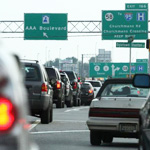

Facebook Twitter Flickr YouTube RSS Feed
Written on: August 20th, 2012 in Archaeology Updates US301
This week a number of personal items were found that tell us about the individuals who lived at the Rumsey/Polk Tenant/Prehistoric site. Most notably, thanks to the sharp eyes of archaeologist and crew member Neal Sexton, a decorated domed brass artifact was identified as the butt cap to an 18th or early 19th-century flintlock pistol handle. Hand engraved, the brass cap was part of a pistol believed to have been American-made and used by an officer in the Continental Army or a member of a militia during the American Revolution. A pewter “USA” button worn by Continental Army soldiers, was found at the site, and was previously featured in a blog entry https://blogs.deldot.gov/2012/07/17/us-route-301-archaeology-update-9/), and further suggests one of the site occupants was a member of the Continental Army. Military objects could also have been owned by a member of the local Bohemia Battalion Mititia commanded by William Rumsey Jr., who was the owner of the site property at that time. Other firearms material has been found at the site, such as French and English gunflints and a canon-style barrel of a flintlock pocket pistol displayed on our public flyer https://deldot.gov/environmental/archaeology/brochures/rumsey_polk/RumseyPolkFlyer.pdf
Additional artifacts found this week include an assortment of plain and decorated pewter and copper alloy coat and vest buttons; a fancy, decorative button with a glass faux gem; and pins used to secure clothing and paper (pins were used prior to the invention of wire paper clips). During the 18th and early 19th century, men’s clothing contained an abundance of functional and decorative buttons, some of which we found littered across the site. Objects like those featured in this week’s blog help us form a picture of the style of dress used by the occupants, and firearms used in defense.